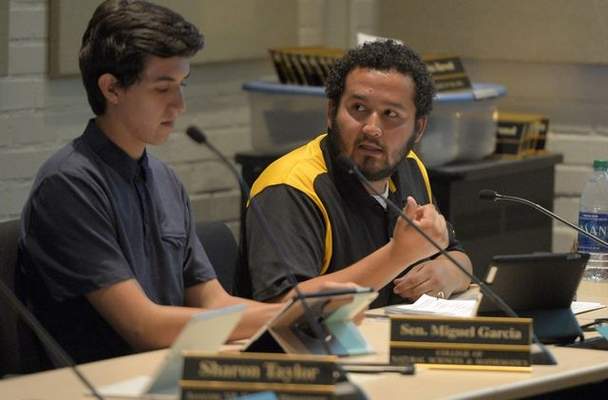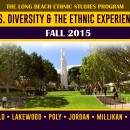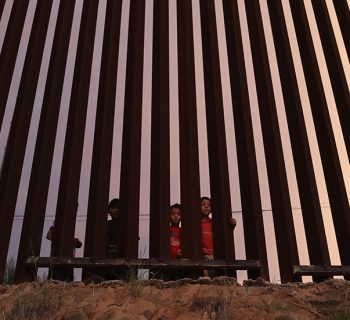By Josh Dulaney, Long Beach Press Telegram
He’s the first undocumented immigrant at Cal State Long Beach to serve as student body president, and now Jose Salazar is leading another campaign, this one to rewrite the rules so that undocumented students who are elected to executive leadership slots can be paid.
Salazar on Tuesday told the Board of Control for Associated Students, Inc. that students like himself, who are not in the country legally and may not have filed documents under the federal Deferred Action for Childhood Arrivals program, should have access to the same reimbursement as native-born students who serve as presidents.
“I feel like we’re currently, as ASI, not being equal to everyone,” Salazar said.
When he previously served as an ASI senator, Salazar — an aerospace engineering major who also is minoring in physics — received up to $640 a semester in director’s fees, which aren’t considered compensation.
A reported 4,527 students turned out to vote last spring, with 52.55 percent electing Salazar as ASI president for 2015-16.
According to ASI documents posted online, a president receives what’s called an “annual fellowship” of $1,264 a month, in addition to having his or her tuition waived by the university.
While Salazar is enjoying the tuition waiver, he hasn’t received any of the $1,264 installments under the annual fellowship. That’s because the fellowship is considered compensation, which Salazar isn’t eligible to receive because he is in the country illegally and has DACA paperwork pending. DACA allows young people, who illegally entered the country as children, to temporarily avoid deportation and obtain work permits if they meet certain guidelines.
Salazar wants the policy changed so that the fellowship becomes a scholarship. If approved by the ASI Senate, the policy change would go into effect June 1, after Salazar’s term is finished.
Under AB 844, undocumented students at California State University schools, as well as California community colleges, may serve in student government and be paid for executive positions through grants, scholarships, fee waivers or expense reimbursements. State Sen. Ricardo Lara, D-Long Beach, wrote the bill in 2011 while he was in the Assembly.

Jose Salazar, third from left, president of CSULB’s Associated Students, Inc., attends a board meeting on campus in Long Beach on Tuesday, Sept. 29, 2015. Because he’s an undocumented immigrant, Salazar is currently not being paid for his position. The board is trying to figure out a way to pay Salazar by revising its policy. (Scott Varley / Staff Photographer)
ASI presidents serve as the CEO of the student government and are required to work 25 hours a week. The president appoints several student government positions and must attend numerous meetings throughout the year, including those of the Board of Control, the Academic Senate and the University Student Union Board of Trustees.
Of concern to ASI leadership is whether the proposed change would kill the ability to hold presidents — and other elected executives in student government — accountable for fulfilling their duties. For example, if the fellowship is turned into a scholarship, then the current 25-hour work week requirement for presidents would have to be lifted, because it’s an employer-employee arrangement.
Theoretically, a student could win election to the presidency, receive scholarship money for the post, and not do the work.
Richard Haller, executive director for ASI, told the Board of Control that before the fellowship system, there were elected executives who didn’t fulfill their roles for a variety of stated reasons. One left because of maternity leave.
Miguel Garcia, an ASI Senate representative and voting member of the Board of Control, said the stories were disheartening, and a bit scary to hear.
“From what I’ve seen and people I’ve talked to, when you keep it as compensation, people really stick to it,” Garcia said.
Another issue is whether turning the fellowship into a scholarship would limit the pool of presidential candidates. Since it’s a scholarship, students elected president may lose out on other financial aid available to them because they already have their tuition waived and are receiving money for service as president.
Earlier this month, Salazar told the campus newspaper, The Daily 49er, that election requirements didn’t mention the need for a Social Security number, and that he didn’t think it was necessary to have one until after he was elected. He also told the newspaper that he wanted to show undocumented students they could run for office, but filed DACA papers once he found out he needed them. The DACA application costs $465.
Jeff Klaus, ASI dean of students, said Tuesday he informed Salazar “that if he’s not DACA-certified or without the policy changing, he’s volunteering” for the presidency.
The Board of Control initially was scheduled to vote on the policy change and then forward it to the ASI Senate. However, they decided to form a committee to hear recommendations from CSULB students.
Miriam Hernandez, ASI vice president and also an undocumented student, worked on a task force that brought about the campus DREAM Resource Center for undocumented students.
“But I want to point out that this is urgent,” she said. “We have someone here not getting paid.”
Contact Josh Dulaney 562-714-2150.







